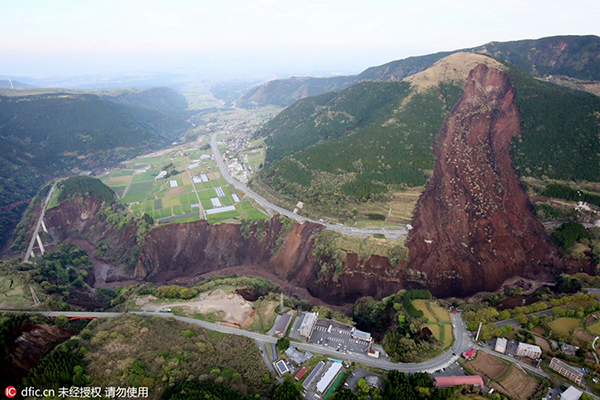 |
|
An aerial view shows a landslide triggered by an earthquake in Kumamoto prefecture, southern Japan, on April 16, 2016. [Photo/IC] |
On Saturday I came across a Beijinger, Yu Shitong, in Mashiki, one of the districts hit hard by the April 16 earthquake in Kumamoto prefecture in southwest Japan. He was helping local evacuees as a volunteer. Some 90,000 people in Kumamoto prefecture are still living in evacuation centers.
This is the 40-something Yu's first trip to Japan; he speaks not a single word of Japanese. After watching the earthquake jolt Kumamoto on TV, he packed his bags and came to what should be a strange place for him to lend a helping hand. What made him do that? He said his experience as a volunteer in Wenchuan, Southwest China's Sichuan province, which was devastated by a powerful quake in 2008, inspired him to lend a helping hand in Mashiki.
Yu rode a bicycle to Mashiki to help with the rescue and relief work during the day and returned to sleep in one of the evacuation centers in Kumamoto city at night. "This is a rewarding experience. It enables me to know how Japan organizes volunteers. It is amazing that they let foreigners like me in as soon as we came," Yu said.
China-funded companies and organizations based in Japan, too, have opened their wallets and hearts to help the quake survivors by raising 18 million yen ($161,000). The Guangxi Zhuang Autonomous Region sent Kumamoto prefecture, with which it has a "sister" partnership, 34 million yen as a show of solidarity.
Kumamoto Governor Ikuo Kabashima told Chinese Ambassador to Japan Cheng Yonghua who visited the quake-hit region at the weekend that it was heartening to see Chinese donating money to help Japanese quake survivors. In return, Cheng, the first foreign diplomat in Japan to visit Kumamoto, thanked the prefecture authorities and residents for evacuating Chinese citizens from the quake zone to safe places. At the request of China's consulate-general in Fukuoka, Kumamoto government officials and Japan's Self-Defense Force personnel rescued 20 Chinese tourists from an isolated hot spring inn at the foothills of Mount Aso.
The Chinese diplomat said the willingness of Chinese and Japanese citizens to help each other reminded him of the mutual support when deadly quakes hit Wenchuan in China in 2008 and Japan's northeast in 2011. The two countries sent rescue teams and supplies to each other at that time.
But the readiness of the two countries and their peoples to help each other has gone largely unreported on both sides. In contrast, polls on the two peoples' unfavorable views of one another are widely covered.
An increasing number of Chinese have been visiting Japan in recent years, and returning home with a clearer picture of their neighbor. Japanese people who are not willing to visit China seem prejudiced by the preconceived notions about China that the Japanese media promote, even though they have been coming across more people from China.
Speaking to business leaders in Tokyo on Monday, Japan's Foreign Minister Fumio Kishida called the record percent of Japanese who don't feel close to China a serious problem. He said Japan-China relations will be like a castle of sand if such mutual distrust continues.
Bilateral relations can get better only if people-to-people exchanges are normal. Disasters bring out the best and the worst in people. In the quake-hit Kumamoto, I have seen the best in the Chinese, as Wenchuan saw the best in the Japanese.
The author is China Daily Tokyo bureau chief. [email protected]

I’ve lived in China for quite a considerable time including my graduate school years, travelled and worked in a few cities and still choose my destination taking into consideration the density of smog or PM2.5 particulate matter in the region.